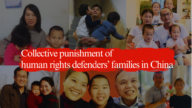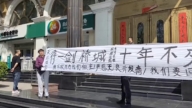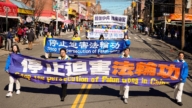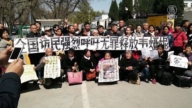【新唐人2014年08月21日讯】8月18号下午,大陆官媒发布了所谓“媒体改革”消息,中共“中央深化改革领导小组”通过了有关媒体的《指导意见》。大陆传媒人士指出,换上新衣的新型媒体,仍然是“党的喉舌”,注定不会有公信力。
中共领导人习近平在“深化改革领导小组”第四次会议上,就推动“新旧媒体融合”表了态。他说,要打造一批形态多样、手段先进、具有竞争力的新型主流媒体。
中共喉舌《新华网》19号的网评毫不隐讳的承认,目前“主流媒体难以引导主流舆论,主流舆论难以有效传播主流声音”,而中共中央给出的所谓“药方”就是:融合。
大陆传媒人士指出,中共这次作出媒体改革的大动作,乃是看到官媒影响力日渐衰退,面对互联网门户网站、社交媒体、自媒体的合围,而作出的反击之态。曾经担任“雅虎中国”公司总经理的谢文,将之称为“喉舌2.0版本”。
原“雅虎中国”总经理谢文:“所谓主流媒体,传统媒体,在整个新闻消息,舆论形成这些方面,越来越吃力,甚至说只能自称主流,实际上已经不是主流了。总要有个应对的办法,应对的办法,除了那种删贴封号,这些比较野蛮的手段以外,总要想办法。知道纸媒不行了,就想办法往互联网上转。”
习近平在有关媒体改革的讲话最后说,要一手抓融合,一手抓管理,确保融合发展沿着正确方向推进。“北京外国语大学国际传播研究中心”主任乔木解读说,“管理”在中国的语境下,实际上就是管控。实际上,当局是希望由官方媒体来融合民间媒体,就是由官媒夺取目前由民营公司盘踞的互联网领域,而互联网公司反向渗透,冲击官方媒体的地盘则不可能。
乔木指出,官方媒体和民间媒体的地位极不对称,并不处于同一个起跑线。
北京外国语大学新闻学副教授乔木:“官方媒体就有采访权,有重要新闻的首发权,互联网门户网站是不容许采访,只能做评论和娱乐新闻,不允许做时政新闻,在前不久官方重申确认了一个国信办的规定,对社交媒体、即时通讯媒体首发新闻做了限制,不允许他们首发新闻。所以在这种存在地位和业务差别的情况下,要融合是很难的。”
谢文表示,现在实际上可以看得出来,今后很有可能的局面是,当局一方面强力扶植官方媒体,一方面打压民营的媒体平台,对民营媒体删贴封号,严管牌照,包括实行某种形式的恐吓。但是他认为,即使民营媒体都被封掉了,网络用户也不会自动转移到所谓主流媒体的平台上去。
习近平还表示,新型媒体集团应该“拥有强大实力和传播力、公信力、影响力”。
可是,谢文认为,中共一直在追求提高喉舌的宣传功率,却不可能做到。
谢文:“它的基本使命和管理机制,限制了比如公信力的问题。消息你不报导,大家就在网上传,等到最后终于报导的时候,一个是过时的消息,一个是各种各样的删改,使得公信力没有。这个不是靠什么手段,靠什么技,所能解决的。”
乔木也表示,中共媒体改变的只是技术手段和媒介形态,不是内容,终究无法获得公信力。
乔木:“里面新华社提到一个最关键的公信力,他这个没法解决,因为你还是党来办的,政府来扶持的,那就有很强的政治导向,那有了政治目地,你再讲公信力,那显然是不可能的。它是为政治服务的。只有有了公信力,才有影响力。”
“广州中山大学传播与设计学院”院长张志安对“英国广播公司”《BBC》表示,中国主流媒体的“底线和底色”,并不会因为言论的尺度或许较前宽松而有变化,这是中国的现实决定的。
采访编辑/秦雪 后制/周天
Mouthpiece Version 2.0: China’s New Style Media
On Aug. 18, China state-run media released news about media
reform with approved guidance from the central reform team.
Experts point out even if the media changes to a new style,
it is still the mouthpiece of the Chinese Communist Party
(CCP), so it certainly won’t have much credibility.
China leader Xi Jinping, spoke at a meeting of the central
leading group for reform,
about the combined new and traditional media.
He stressed the build ing of new-type mainstream media groups,
with multiple styles, advanced and competitive.
The CCP’s mouthpiece, Xinhua website admitted that
currently, mainstream media has difficulty in leading opinion,
or effectively spreading the mainstream voice.
The central regime’s reform for media is to “combine
traditional media with new media forms”.
Experts say that it is a CCP counter attack, in the face of
criticism from netizens, social and nongovernmental media,
because it realizes that the influence of its mouthpiece
media is declining.
Xie Wen, former president of Yahoo China called
the reform “mouthpiece version 2.0”.
Xie Wen: “The so-called mainstream media or
traditional media finds news reporting difficult.
It claims to be mainstream, actually it isn’t.
They try to find a way to deal with it, other than deleting
online messages, violent methods, or looking the other way.
They know the newspaper is dying,
so they intend to find a way on social media.”
Xi Jinping finally suggested that media reform should focus
on combination and management,
and ensure the combination development
goes in a correct direction.
Qiao Mu, director of Beijing School of English and International
Studies said that word “management” in China means “control”.
The regime is hoping state-run media combines with
nongovernmental to take over private-run social networks.
However, it is impossible the other way round that social networks
take over state-run media.
Qiao says that state-run and nongovernmental media
are neither in the same position nor on the same line.
Qiao Mu: “State-run media has a right to report and interview,
has the right to publish important news first.
Social media is not allowed to interview but only
to make comments or report on entertainment news.
It is not allowed to report current affairs.
Recent new measures from the central regime
restricted social media reports on breaking news.
Social media is not allowed to be the first media
to report news.
So under this unfair condition, to combine media is difficult.”
Xie Wen says that from his observation, the future situation
would be that the regime strongly develops state-run media,
suppressing nongovernmental media platforms,
deleting messages, closing users accounts,
and restricting licenses including a kind of threat.
Xie says even if all nongovernmental media were shut down
netizers would not move to the so-called mainstream platform.
Xi Jinping also stressed that “new style media groups”
should have “strength, ability to spread,
credibility and great influence”.
Xie Wen says that the CCP pursues efficiency of
propaganda but it can’t achieve this.
Xie Wen: “The CCP’s fundamental task and management
limit issues such as credibility.
If they don’t report the news, people will look it up online.
When news is finally reported, it either becomes old news
or re-edited and censored news, thus losing credibility.
Any kind of methods or technique
cannot solve such problems.”
Qiao Mu says that the state-run media only changes its
technique and style but not the content.
Indeed it cannot gain any credit.
Qiao Mu: “Xinhua News Agency mentioned an important
point is credibility but they cannot resolve this problem.
Because the media is run by the CCP, supporting the regime.
In this regard, it has strong political intentions and goals.
Then it talks about credibility again, it becomes impossible,
because it serves politics.
Only if credibility exists, can influence be applicable.”
Zhang Zhi’an, dean of the School of Communication
and Design, Sun Yat-sen University told the BBC that
the bottom line of mainstream media in China wouldn’t change,
not just because of slightly easier expression,
this is decided by the current China.
Interview & Edit/QingXue Post-Production/ZhouTian

























